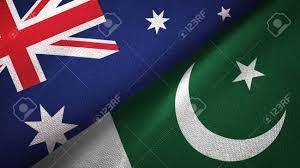ISLAMABAD: Pakistan’s bilateral trade with Australia was recorded at $200 million during the first quarter of the current fiscal year, according to the State Bank of Pakistan (SBP).
A decline of 7% was recorded in bilateral trade between Pakistan and Australia during Q1 2022-23 against the same period of last year. The volume of bilateral trade was registered at $215 million during July-September FY23. Pakistan’s exports to Australia rose to $76.37 million during Q1 FY23 from $71.07 million during the same period of the preceding year, with an increase of 7.45%.
Pakistan’s imports from Australia declined by 14.05% and dropped to $124.35 million during the first quarter of the current fiscal year from $144.69 million during the corresponding months of the preceding year, the SBP data shows. Pakistan’s trade deficit with Australia declined by 34.24% during the period under review and dropped to $48 million from $73 million during the corresponding period of last year. Pakistan’s exports to Australia also remained positive during September 2022 and went up to $24.28 million from $21.52 million during the same month of 2021.
Imports from Australia dropped by 45% during September and declined to $32.71 million from $59.86 million during the corresponding month of last year.
According to an estimate of the Ministry of Commerce, Pakistan has the potential to enhance its exports to Australia by up to $500 million within three to five years. Exports of textile, food items especially rice and leather goods, can be enhanced within minimum time as these commodities are in high demand in Australia.
According to Consulate General and Trade Commission of Pakistan in Sydney, Pakistan’s top 10 export products to Australia include textile made-ups, garments, iron and steel (mainly pipes), cereals (mainly basmati rice), leather goods (mainly gloves), processed food (mainly spices), textile fabrics, surgical instruments, sports goods and miscellaneous agro food items.
The top 10 products constitute 95% of Pakistan’s exports to Australia. At the product group level, textile group constitutes 69% of exports, agro-food group 12.6%, metals group 7.2%, leather group 6.1%, and surgical instruments 3.3%.
To promote exports to Australia, the Ministry of Commerce has established a bilateral Joint Trade Committee (JTC) in collaboration with relevant Australian authorities. Pakistani dates have also been introduced in Woolworths, the largest supermarket chain in Australia. A social media platform on Facebook and Twitter, named “Made in Pakistan for Australia” was launched to run different promotional campaigns about Pakistani products such as home textiles, spices, sports goods, and mango being sold in Australia.
The Ministry of Commerce, Pakistan’s Consulate General in Sydney and Pakistan Software Export Board (PSEB) have launched a joint program to promote IT (information technology) services in Australia.
Pakistan’s imports from Australia include pulses, LNG and coal, iron and steel (scrap and flat-rolled), unwrought zinc, wood products (mainly paper, paperboard), fertilisers (DAP), metals, office machinery, dyes and pigments, and chocolates.
The major product categories of import include food items 42%, petroleum products (mainly coal and LNG) 24%, metals 19%, agricultural and other chemicals 8%, and machinery 3%.






